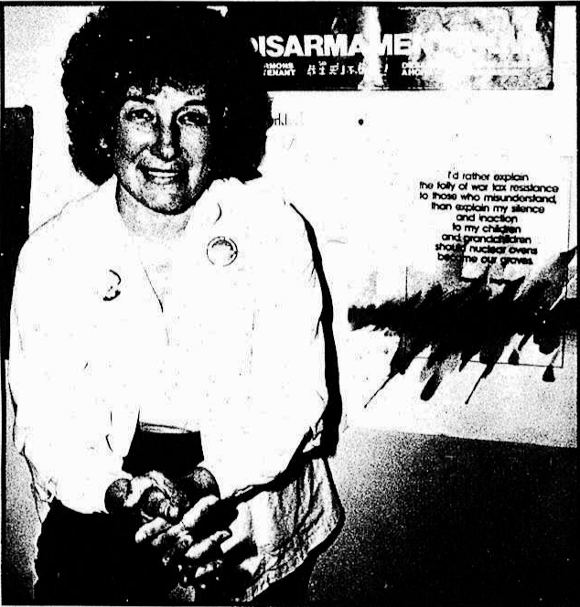The Yonkers Herald Statesman profiled war tax resister Connie Hogarth on . I’ve only found fragments of the article on-line, but here is a brief excerpt about her tax resistance:
This year, she has taken a more personal tack. While acknowledging that it may not immediately hasten disarmament. Mrs. Hogarth and her former WESPAC co-chairman, Charles Scheiner, and several other county residents are refusing to pay the IRS a large percentage of their income taxes. Instead, they are depositing the money into something called the Greater Westchester Alternative Fund. So far, about 20 people are withholding payment of up to 40 percent of their federal taxes, the amount they estimate would go to the military. The fund, under the direction of an elected board, has pledged to allocate the money to community projects such as day-care centers and drug-rehabilitation programs already suffering from federal budget cuts.
Mrs. Hogarth explained all this to the IRS in a cordial February letter which began, “Dear People:” She was withholding, she explained in phraseology typical of her. “so that I can withstand being complicit in fueling the move toward human destruction by nuclear madness.” Then she quoted a Mennonite who said. “I’d rather explain the folly of war tax resistance to those who misunderstand, than explain my silence and inaction to my children and grandchildren, should nuclear ovens become our graves.”
In closing, she told the IRS. “The dangers are too real… life is too precious. I hope you will try to understand and perhaps follow.” This final suggestion that the people opening the mail at the IRS might be compassionate, thoughtful and even courageous fellow citizens underscores Mrs. Hogarth’s indefatigable nature. She believes “converts” are to be found everywhere.
…Mrs. Hogarth’s “conversion” of one Gary Ward remains a favorite characterization of her faith. Ward was the New York City police officer who guarded Mrs. Hogarth following her arrest during the first United Nations special session on disarmament in . She spoke with him at length and decided that, “he’s really sympathetic to us.” She immediately put the officer on WESPAC’s permanent mailing list. “Of course,” one WESPAC volunteer adds cheerfully, “we’ve never heard a word from him.”
After watching Mrs. Hogarth one morning in front of the IRS, the conversion of Officer Ward does not seem farfetched. In contrast to the stereotypical dissenter, Mrs. Hogarth rarely registers an alienating note. Instead, she uses a delightfully subversive quality known as charm. Not surprisingly, the federal Protective Services police assigned to sit in their car and observe the protest took home a handful of Jobs-with-Peace petitions after Mrs. Hogarth spent a few minutes with them.

Connie Hogarth; the poster next to her reads: “I’d rather explain the folly of war tax resistance to those who misunderstand than explain my silence and inaction to my children and grandchildren should nuclear ovens become our graves.”
